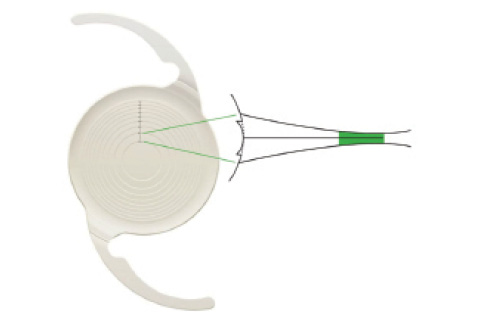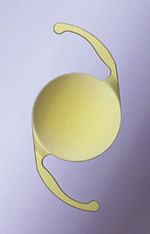It’s amazing how far cataract surgery has evolved in the last 40 years. There’s never been a better time to see clearly again! The cataract surgeons at Capitol Eye Care offer a selection of premium lens implant options that have the potential to dramatically reduce the need for glasses. These lens implants can also be used in refractive lens exchange.
In order to understand the importance of premium lenses, it’s a good idea to understand monofocal lens implants or monofocal IOLs.
Monofocal lens implants bend light rays such that light is focused to a specific focal point. Typically, patients who receive a monofocal lens implant placed at the time of cataract surgery have reasonably good vision at a certain distance, generally far away. Medicare and other insurers pay for high-quality monofocal IOLs. For patients who don’t mind wearing glasses, the monofocal IOL is a good choice. Newer “advanced technology” lens implants are now available that can correct vision at near, intermediate, and far distances. These various types of lenses, commonly called lifestyle lens implants or premium lens implants, are listed below. Multifocal, toric, and extended depth of focus implants are all considered premium lens implants.

Unlike monofocal IOLs, multifocal IOL lens implants enable patients to see at near and far distances without glasses after surgery. The two major brand names in this category are the AcrySof® ReSTOR® IOL by Alcon and the Tecnis® by Abbott. Multifocal IOLs use diffractive technology to create two focal points, one for near and one for far. Sometimes the intermediate vision can be a bit out of focus, but generally patients with this type of implant wear glasses infrequently, if at all. Patients with multifocal IOLs frequently notice halos around lights at night, but these halos generally dissipate over time and do not usually cause patients to avoid driving at night.
The Symfony IOL from Abbott Technologies is much like the multifocal IOL, but with improved intermediate range vision. On the flip side, the near vision is not quite as good as the near vision seen with the multifocal IOL. The halos are generally a bit less with the Symfony, however. Patients with Symfony IOLs might occasionally find it necessary to wear reading glasses for fine print, but hand-held items like tablet computers and cellphones are usually in good focus.


A toric lens implant is a unique type of lens implant used to correct astigmatism. Asymmetric steepening of the cornea causes light to be focused unevenly – the main optical problem in astigmatism. To individuals with astigmatism, images may look blurry or shadowed. Astigmatism frequently accompanies nearsightedness or farsightedness and is very common. Astigmatism can be corrected with glasses, contact lenses, corneal relaxing incisions, laser vision correction, and special implant lenses. If a cataract patient has astigmatism and aspires to be glasses free after surgery, a toric lens implant is a good option. The satisfaction rate among patients with toric IOLs is very high.
Premium lens implants can be very exciting for patients that want freedom from glasses after cataract surgery or clear lens extraction. The experienced surgeons and staff at Capitol Eye Care can help determine if a premium IOL can work for you!